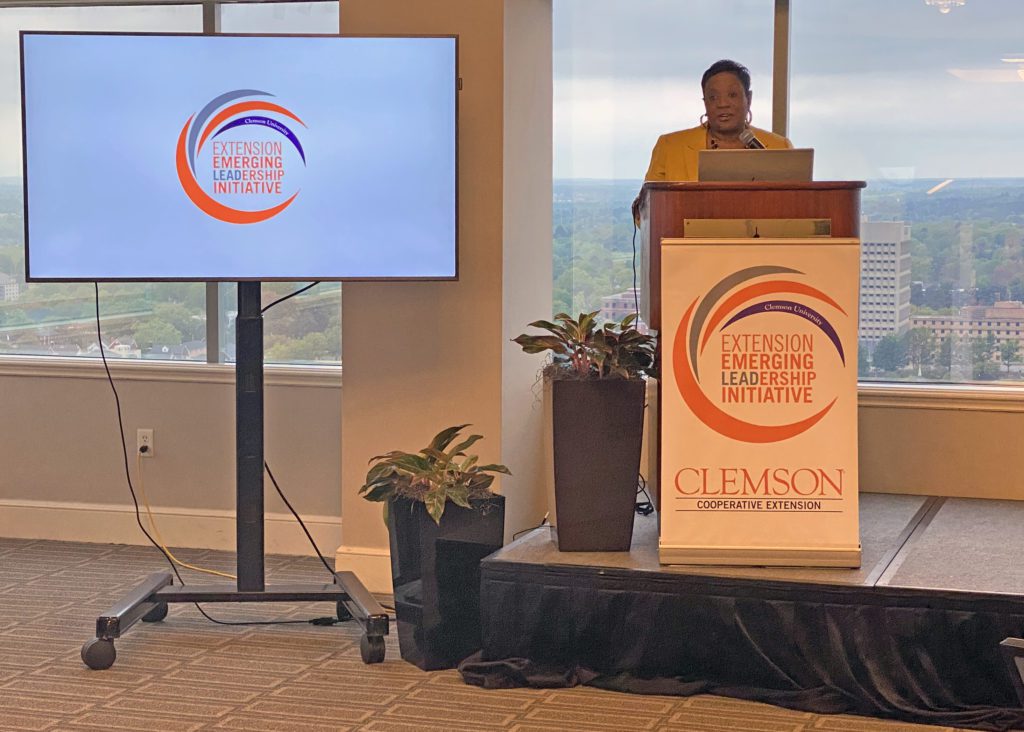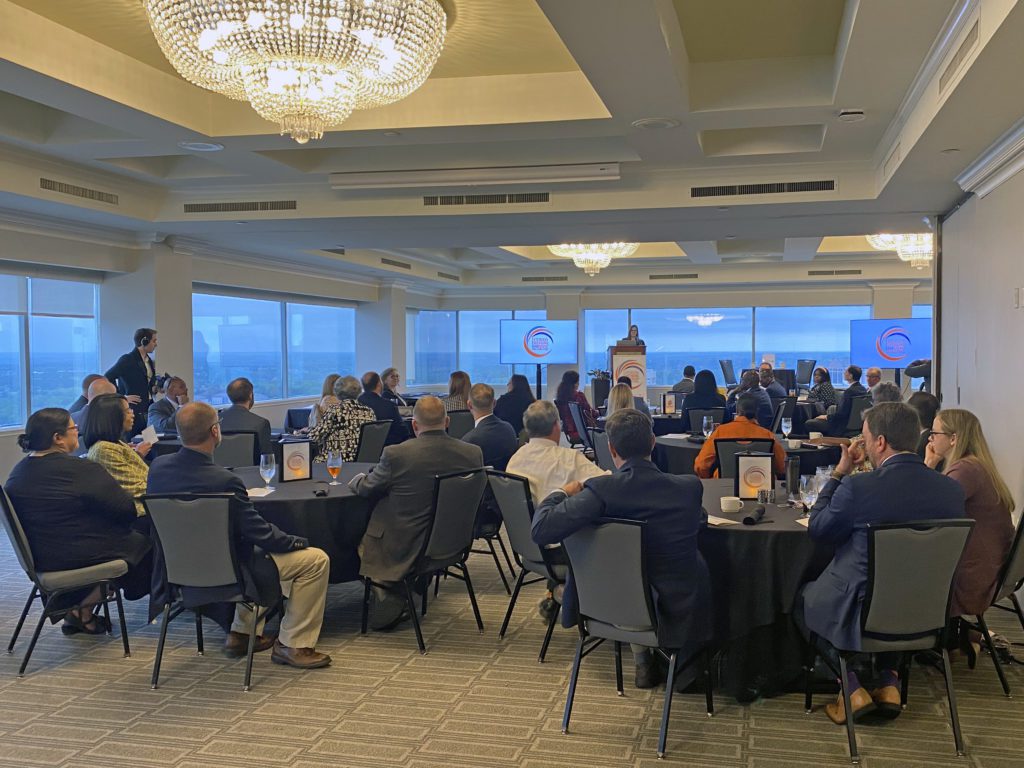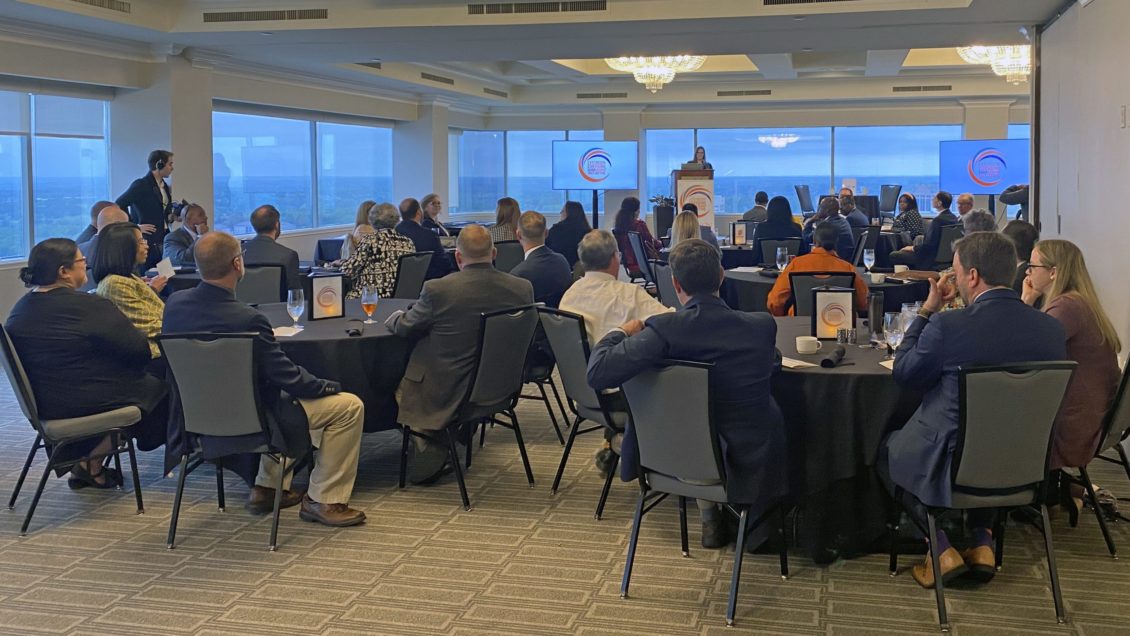South Carolina has two land-grant institutions, each with its own Extension service, and such an environment could easily breed competition. But to the professionals at both schools, Clemson and South Carolina State share the same Extension mission — which means they are all playing for the same team.
It’s all for one and one for all when it comes to serving the people of the state.
Clemson Cooperative Extension celebrated the graduation of the second cohort of its Extension Emerging Leadership Initiative (EELI) program in early April in Columbia, and for the first time, three members of South Carolina State University’s 1890 Research & Extension Program were included in the current cohort with the goal of building more connections among the state’s Extension professionals.
Amber Starnes, a Clemson Extension livestock agent in Chesterfield County, said being part of the cohort had given her the opportunity to build connections around the state that wouldn’t have otherwise been possible.
“We’ve grown our networking not only at Clemson University, but also South Carolina State — since this is the first year that we have had that opportunity to have both come together — so that’s been awesome to learn the different dynamics between the two land-grant universities in the state,” Starnes said.
Extension serves as the outreach arm of an institution’s three-pronged land-grant mission — of education, research and outreach — to improve the quality of life of all South Carolinians by providing unbiased, research-based information through an array of public outreach programs.
The Morrill Act of 1862 was enacted during the American Civil War and allowed for the creation of land-grant colleges such as Clemson in U.S. states, while the second Morrill Act of 1890 expanded the model to include the 1890 land-grant institutions such as SC State and other historically Black universities. Clemson Extension has offices in all 46 South Carolina counties, while S.C. State has offices in 32 counties and counting as it continues to expand its footprint.
“Together, we grow,” Starnes said. “So, we can help each other with different programs and different areas of the state, as well, and that helps us all promote unbiased research.”
EELI was created to provide tools and skills to enhance leadership for Extension professionals, and it was created by someone who knows a thing or two about leadership herself — Clemson Extension Director of Field Operations and Personnel Management Deon Legette.
After participating in the President’s Leadership Institute, Legette was inspired to develop the EELI program in 2018. Two years later, Legette was awarded the prestigious Martin Luther King Jr. Award for Excellence in Service by the President’s Office and the Division of Inclusion and Equity at Clemson University.

S.C. State 1890 Extension Education, Innovation and Support Coordinator Sydney Keith pointed to Legette as a driving force in the collaboration between the services that has taken place since the cohort began the EELI program.
“I was truly happy Deon had the vision to make EELI a collaborative vision this year,” Keith said. “We started out virtual, then we went to in-person, then virtual and now we’re ending up back in person. From the all-day Zoom calls, to the traveling to Clemson and to South Carolina State University, I sure wouldn’t trade any of this experience for the world.”
In addition to the three members of the cohort from S.C., there were also 18 professionals from Clemson Extension who graduated from the EELI program, also including for the first time three faculty and staff from Clemson’s College of Agriculture, Forestry and Life Sciences (CAFLS) — further building connections from one side of the state to the other.
“All the information has been really useful, but the main thing that I’ve really enjoyed about it is getting to know my colleagues better,” said William Hardee, area agronomy agent for Horry and Marion counties and Clemson Extension tobacco specialist. “My office is in the corner of the state and I don’t often get to interact with some Extension colleagues often, so it’s been nice to get out and get to know people and make those connections in other parts of the state.”
“It’s essential to our mission to be able to work together and get the job done. We all have the same goal: to help the people of the state,” Hardee added.
Katie Shaw, 4-H Youth Development specialist, called EELI “an incredible experience,” saying she had learned a great deal from her coworkers and strengthened relationships with them along the way.
“I would encourage anyone to be part of this program because we’re learning a lot of things that you’re not taught in traditional education or in the workplace. It gives you the skills to be a better leader and to be ready for that next step in your life,” Shaw said. “The cool thing that I heard from the first cohort (that made me want to participate) is how close they had become and how they could rely on each other and just create a whole network of leadership that they didn’t have before.”

South Carolina State Vice President & Executive Director of 1890 Land Grant Programs Louis Whitesides said while the two Extension programs have worked together for decades, the current landscape of collaboration between the two allowed for accomplishments that would have previously been impossible.
“When we talk about Extension, it’s always been cooperative for me and it’s always been cooperative for our two universities; it’s just our leaderships didn’t know it,” Whitesides joked. “But now we know it and now we’re showing it, and I think this program is a great testament to that. When I think about our journey in South Carolina in Extension — I grew up as a 4-H’er … so I experienced both sides of what Extension could be for Clemson and for South Carolina State.
“I travel across the country all the time, and I can tell you there’s no better Extension system in the country than in South Carolina. It’s not even close. People talk about being friends and they talk about collaborating, but they really don’t — not like we do.”
The graduates of the 2021-22 cohort of EELI are:
• Katie Altman Collins, Water Resources Agent — Sumter County
• Lance Beecher, Assistant Extension Specialist — CAFLS
• Ben Boyles, Agribusiness Agent — York County
• Chad Carter, Food Safety/Systems Associate — Charleston County
• Sherry Davis-Livingston, 4-H Agent — Georgetown County
• Jason Gore, FFA/4-H Program Coordinator
• Jeremy Greene, Professor of Entomology — CAFLS
• William Hardee, Agronomy Agent — Horry County
• Lauren Hood, 4-H Agent — York County
• Karen Jackson, Water Resources Agent — Richland County
• Yashia Marshall, Grants Coordinator — CAFLS
• Rhonda Matthews, Rural Health Extension Associate — Greenwood County
• Jenny Mountford, 4-H Agent — Abbeville County
• Katie Shaw, 4-H Extension Associate — Sandhill Research and Education Center
• Amber Starnes, Livestock Agent — Chesterfield
• Guinn Wallover, Water Resources — Berkeley
• Alana West, 4-H Agent, Newberry
• Kevin Burkett, Agribusiness Extension Associate — Sandhill REC
• Renee Hall, 4-H Agent Upstate region — SC State 1890 Research and Extension
• Cornelius Hamilton, Acting Regional Director – Lowcountry — SC State 1890 Research and Extension
• Sydney Keith, Education, Innovation and Support Coordinator — SC State 1890 Research and Extension
Get in touch and we will connect you with the author or another expert.
Or email us at news@clemson.edu

